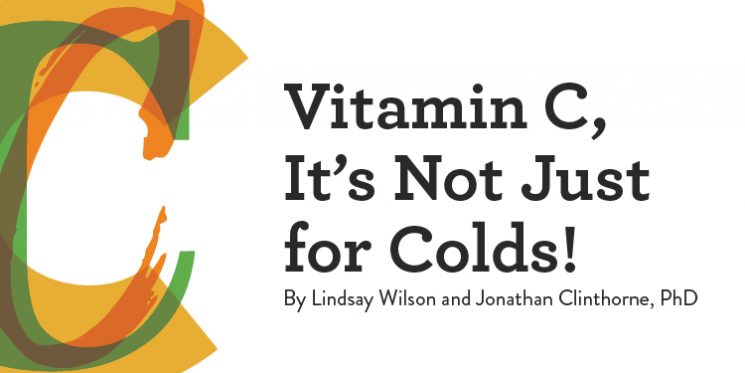


Sign-up for {N}power to get exclusive discounts, newsletters, members-only features, and more!


Vitamin C. Quick! What’s the first thing that comes to mind?
…I bet you thought of an orange, didn’t you? Maybe “immunity” or “colds?” And while you are correct—oranges are a good source of the vitamin (although mangoes, strawberries, and even Brussels sprouts are better sources) and vitamin C is necessary for optimal immunity—there is so much more that this essential vitamin does for our bodies! Think glowing skin, easy-moving joints, tip-top adrenal function, and peak vascular health. Yep, when it comes to optimal health, vitamin C gets an A+.
You could say that without vitamin C, our bodies would fall apart. Really. We need vitamin C to make collagen, the most abundant protein in the body that makes up our skin, cartilage, tendons, ligaments, and blood vessels; it is also needed to heal wounds and to build strong bones. Collagen gains its strength by forming a special structure called a triple helix, and vitamin C facilitates the biochemical reactions necessary to form this structure.1 For smooth-moving joints, tough tendons and ligaments, and strong blood vessels, vitamin C is absolutely necessary. Indeed, many of the classical signs of a vitamin C deficiency are things like bleeding gums and slow wound healing, all due to a lack of collagen production. Vitamin C is also concentrated in the skin, where it has been shown through its antioxidant activity to protect the skin from UV damage. An observational study in humans found that higher intakes of vitamin C decreased wrinkles and dryness among middle-aged women, and other studies show that using topical vitamin C for about four months decreases wrinkles, reduces roughness, and increases collagen production.2 3 Go for the glow with vitamin C!
Vitamin C has broad-reaching effects on our immune systems, influencing the function of both the innate and adaptive systems, key immune cells, and the production of antibodies. When we have less-than-optimal levels of the vitamin, immunity suffers, making us more susceptible to catch every cold that comes our way. When an infection is present in the body, immune cells furiously gobble up vitamin C—it appears that immune cell function is directly related to how much vitamin C they contain. Because they take up so much of the vitamin while they are fighting invading pathogens, blood levels of vitamin C drastically drop, making it important to increase your intake of the vitamin when you are feeling under the weather, or even experiencing chronic illness or inflammation. And while the reviews are mixed on whether vitamin C can prevent the common cold, there is plenty of evidence showing that it reduces the duration and the symptoms, making kicking a cold much easier.4 5 Older adults, chronically ill people, smokers, and people under stress are more likely to have insufficient levels of vitamin C, making supplementation especially beneficial.
Not enough energy to enjoy life to the fullest? One surprising reason: not enough vitamin C. What are of the first signs of low levels of vitamin C? Fatigue, lassitude, and depression.6 This isn’t too shocking as vitamin C plays a crucial role in several processes that are key for mood, motivation, and energy production. Research shows that our brains need vitamin C in order to produce neurotransmitters such as norepinephrine and serotonin—chemical messengers frequently targeted by anti-depressant drugs because of their importance in depression and mood.7 8 Furthermore, vitamin C is required for the synthesis of carnitine, an important molecule that facilitates that burning of fatty acids in the mitochondria (the energy producing power plants in our cells).9 Speaking of mitochondria, studies show that mitochondria actually have the ability to take up vitamin C, and that vitamin C can protect our mitochondria from collateral damage that may occur during the energy production process.10
February is heart health month and the ultimate way to love your heart all year round is by getting enough of, you guessed it, vitamin C! It’s been proven to have a positive impact on balancing blood pressure levels and the higher the circulating vitamin C levels, the lower the blood pressure. By working at reducing endothelial dysfunction, vitamin C counteracts one of the first pathways involved in cardiovascular decline.19 Cigarette smoking (so bad for the heart!) drastically reduces the amount of vitamin C in the body, so smokers are at an increased risk of a deficiency. It’s recommended that smokers get an additional 35mg in addition to the regular RDI.20

One of the hallmarks of cardiovascular disease is something called endothelial dysfunction where the cells and collagen lining our blood vessels constrict and harden leading to high blood pressure. Numerous research papers have shown that there is an inverse correlation between vitamin C levels in the blood and a person’s blood pressure—the higher their circulating vitamin C levels the lower their blood pressure.11 One of the factors that cause endothelial dysfunction is over production of a pro-inflammatory hormone known as endothelin-1. Studies show that vitamin C supplementation can lower circulating levels of endothelin-1, improving blood flow.12 A large scale meta-analysis of 44 studies conducted on the effect of vitamin C on endothelial function concluded that vitamin C supplementation results in improved endothelial function in a dose dependent fashion, and was most beneficial for those with the highest cardiovascular disease risk. Other research suggests vitamin C enhances the synthesis of type IV collagen which functions as the foundation for the formation of capillaries, reduces the permeability of the endothelial barrier, and also helps preserve nitric oxide, helping blood vessels relax, and lowering blood pressure.13
By supporting endothelial functioning, vitamin C also supports healthy LDL particle number (or the number of cargo ships that help carry cholesterol and fats throughout the body). This is important, because when we have too many LDL cargo ships in the body, it increases the risk for atherosclerosis and heart disease. When vitamin C levels are low, the blood vessels become weakened and damage to the arterial wall is more likely. This, in turn, causes LDL particle numbers (or cargo ships) to increase and deposit in the vascular wall where they promote atherosclerotic lesions and, thus, atherosclerosis.14
But wait! There’s more! Vitamin C supplementation not only benefits heart health by improving endothelial function, but it also functions as an antioxidant, protecting our cardiovascular system from oxidative damage caused by high blood sugar levels, and recycles other antioxidants, helping keep free radicals in check.
Research suggests that vitamin C supplementation increases cognitive performance, attention, and motivation in adults, especially during work or study-related tasks. In healthy adults 20-39 years of age, who had inadequate blood levels of vitamin C (defined as <50 mmol/L), supplementing with 500 mg of vitamin C twice daily for four weeks not only brought their blood levels of vitamin C into the healthy range, but also improved scores of attention and work engagement, as well as processing speed and focus during taxing cognitive tasks.15 Considering nearly half the adult population does not consume an adequate amount of vitamin C, supplementation may benefit many adults’ cognitive function.
For Vegans/Veggies:
Did you know that vitamin C enhances the absorption of iron in plant-based foods? Non-heme iron, which is the type of iron found in plant foods, is typically not as well absorbed as heme-iron from animal sources. Vitamin C has been shown to help boost absorption of non-heme iron when consumed at the same time.
Vitamin C can be found in nearly every tissue and cell in the human body. Because it is so widespread, so are its overall health benefits. A large body of research links vitamin C levels with optimal neurological function, eye health, fertility, blood sugar balance and diabetes, and even gout.16 In order to maintain optimal levels of vitamin C in the body, it’s estimated that humans need to consume at least 5 servings of fruits and vegetables high in vitamin C daily—something that the vast majority of Americans fail to do successfully. And that’s assuming that the vitamin C in their food wasn’t destroyed during transportation, storage, and cooking. Other data suggests that the nutrient content of food has declined over the last 50 years, largely in part due to poor soil quality and higher carbon dioxide levels in the atmosphere.17 18 One way to find food with the highest vitamin C content is to look for organic fruits and vegetables, as organic fruits and vegetables tend to have higher levels of this crucial vitamin.19 And, if you’re not getting the recommended servings of 5 fruits and vegetables high in vitamin C daily, or if you are experiencing chronic stress which causes your body to burn through vitamin C, try a vitamin C supplement. Doses around 500 – 1000mg have been shown to help maintain optimal blood levels of vitamin C.20
What is old is new again, but much like the fanny pack of the 80s, vitamin C insufficiency is one health trend that should never make a resurgence. And yet, sadly, both have. While scurvy—the nutrient deficiency disease that is estimated to have caused the most suffering ever in recorded history—is not as widespread or common as it once was, today we are facing a modern-day scourge of suboptimal intake of vitamin C.21 This insufficiency is silently wreaking havoc on our health, and in ways you’d least expect. But even in the U.S, where there is an abundance of fruits and vegetables, as many as 8% of males and 6% of females have blood levels of vitamin C below 11uM, low enough to clinically diagnose them with scurvy. Perhaps what is even more problematic is that at least 40% of adults fall below the recommended daily intake of 75mg to 90mg for women and men, respectively.22 And while this level is the amount set to prevent scurvy, to maintain optimal blood levels of vitamin C (50uM) you need at least 250mg per day. Studies indicate when blood levels fall to even 20uM, symptoms like fatigue and lack of energy become apparent. Sound familiar? In fact, the first symptom of vitamin C insufficiency is known as “lassitude” which is a state of physical or mental weariness, lack of energy, and irritability.23 Other symptoms include gingivitis and bleeding gums, rough, dry skin, slow wound healing and easy bruising, and an increased susceptibility to infection. Add anxiety and depression to that list, too. One interesting study that examined the effects of vitamin C (500mg/day) on anxiety levels in high school students, saw that as blood levels of vitamin C increased with supplementation, anxiety levels decreased—leading the authors to conclude, “vitamin C plays an important therapeutic role for anxiety.” 24



Sign-up for {N}power to get exclusive discounts, newsletters, members-only features, and more!